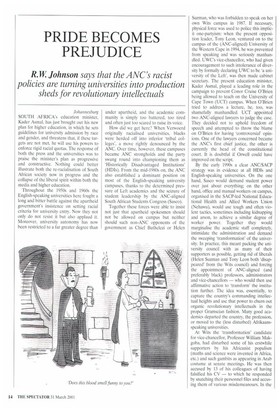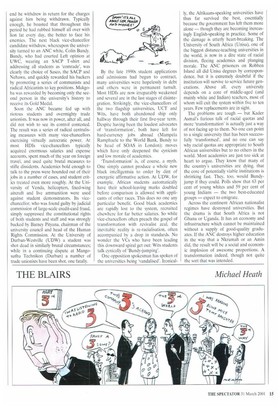PRIDE BECOMES PREJUDICE
R.W. Johnson says that the ANC's racist
policies are turning universities into production sheds for revolutionary intellectuals
Johannesburg SOUTH AFRICA's education minister, Kader Asmal. has just brought out his new plan for higher education, in which he sets guidelines for University admission by race and gender, and threatens that, if these targets are not met, he will use his powers to enforce rigid racial quotas. The response of both the press and the universities was to praise the minister's plan as progressive and constructive. Nothing could better illustrate both the re-racialisation of South African society now in progress and the collapse of the liberal spirit within both the media and higher education.
Throughout the 1950s and 1960s the English-speaking universities here fought a long and bitter battle against the apartheid government's insistence on setting racial criteria for university entry. Now they not only do not resist it but also applaud it. Moreover, university autonomy has now been restricted to a far greater degree than under apartheid, and the academic community is simply too battered, too tired and often just too scared to raise its voice.
How did we get here? When Verwoerd originally racialised universities, blacks were herded off into inferior 'tribal colleges', a move rightly denounced by the ANC. Over time, however, these campuses became ANC strongholds and the party swung round into championing them as 'Historically Disadvantaged Institutions' (HDIs). From the mid-1980s on, the ANC also established a dominant position on most of the English-speaking university campuses, thanks to the determined pressure of Left academics and the seizure of student leadership by the ANC-aligned South African Students Congress (Sasco).
Together these forces were able to insist not just that apartheid spokesmen should not be allowed on campus but neither should such non-ANC opponents of the government as Chief Buthelezi or Helen Suzman, who was forbidden to speak on her own Wits campus in 1987. If necessary, physical force was used to police this implicit one-partyism: when the present opposition leader, Tony Leon, ventured on to the campus of the (ANC-aligned) University of the Western Cape in 1994, he was prevented from speaking and was seriously manhandled. UWC's vice-chancellor, who had given encouragement to such intolerance of diversity by formally declaring UWC to be 'a university of the Left', was then made cabinet secretary. The present education minister, Kader Asmal, played a leading role in the campaign to prevent Conor Cruise O'Brien being allowed to teach on the University of Cape Town (UCT) campus. When O'Brien tried to address a lecture, he, too, was shamefully manhandled. UCT appointed two ANC-aligned lawyers to judge the case. They decided not to uphold freedom of speech and attempted to throw the blame on O'Brien for having 'controversial' opinions. One of the lawyers concerned became the ANC's first chief justice, the other is currently the head of the constitutional court. It is doubtful if Orwell could have improved on the script.
By the early 1990s a clear ANC/SACP strategy was in evidence at all HDIs and English-speaking universities. On the one hand, Sasco would demand student power over just about everything; on the other hand, office and manual workers on campus, organised in the SACP-led National Educational Health and Allied Workers Union (Nehawu), would use tough and often violent tactics, sometimes including kidnapping and arson, to achieve a similar degree of worker power. Together they would marginalise the academic staff completely, intimidate the administration and demand the sweeping 'transformation' of the university. In practice, this meant packing the university council with as many of their supporters as possible, getting rid of liberals (Helen Suzman and Tony Leon both 'disappeared' from the Wits council) and forcing the appointment of ANC-aligned (and preferably black) professors, administrators and vice-chancellors — who would then use affirmative action to 'transform' the institution further. The idea was, essentially, to capture the country's commanding intellectual heights and use that power to churn out organic revolutionary intellectuals in the proper Gratnscian fashion. Many good academics departed the country, the profession, or moved to the (less disturbed) Afrikaansspeaking universities.
At Wits the 'transformation' candidate for vice-chancellor, Professor William Makgoba, had disturbed some of his erstwhile supporters by his Africanist populism (maths and science were invented in Africa, etc.) and such gambits as appearing in Arab costume at senate meetings. He was then accused by 13 of his colleagues of having falsified his CV — to which he responded by snatching their personnel files and accusing them of various misdemeanours. In the
end he withdrew in return for the charges against him being withdrawn. Typically enough, he boasted that throughout this period he had rubbed himself all over with lion fat every day, the better to face his enemies. The next black vice-chancellor candidate withdrew, whereupon the university turned to an ANC white, Colin Bundy. Bundy, who had courted Left opinion at UWC, wearing an SACP T-shirt and addressing all students as 'comrade', was clearly the choice of Sasco, the SACP and Nehawu, and quickly rewarded his backers by promoting a series of communists and radical Africanists to key positions. Makgoba was rewarded by becoming only the second person in the university's history to receive its Gold Medal.
Soon the ANC became fed up with riotous students and overmighty trade unionists. It was now in power, after all, and did not wish to see its control contested. The result was a series of radical centralising measures with many vice-chancellors exercising virtually autocratic power. At most HDIs vice-chancellors typically acquired enormous salaries and expense accounts, spent much of the year on foreign travel, and used quite brutal measures to stifle dissidents. Academics bold enough to talk to the press were hounded out of their jobs in a number of cases, and student critics treated even more roughly. At the University of Venda, helicopters, fixed-wing aircraft and live ammunition were used against student demonstrators. Its vicechancellor, who was found guilty by judicial commission of large-scale credit-card fraud, simply suppressed the constitutional rights of both students and staff and was strongly backed by Barney Pityana, chairman of the university council and head of the Human Rights Commission. At the University of Durban-Westville (UDW) a student was shot dead in similarly brutal circumstances; while in a continuing dispute at Mangosuthu Technikon (Durban) a number of trade unionists have been shot, one fatally. By the late 1990s student applications and admissions had begun to contract, many universities were hopelessly in debt and others were in permanent tumult. Most HDIs are now irreparably weakened and several are in the last stages of disintegration. Strikingly, the vice-chancellors of the two flagship universities, UCT and Wits, have both abandoned ship only halfway through their first five-year term. Despite having been the loudest advocates of 'transformation', both have left for hard-currency jobs abroad (Mampela Ramphaele to the World Bank, Bundy to be head of SOAS in London); moves which have only deepened the cynicism and low morale of academics.
'Transformation' is, of course, a myth. One simply cannot produce a whole new black intelligentsia to order by dint of energetic affirmative action. At UDW, for example. African students automatically have their school-leaving marks doubled before comparison is allowed with applicants of other races. This does no one any particular benefit. Good black academics are rapidly lost to the system, recruited elsewhere for far better salaries. So while vice-chancellors often preach the gospel of transformation with revivalist zeal, the inevitable reality is re-racialisation, often accompanied by a drop in standards. No wonder the VCs who have been leading this downward spiral get out: Wits students talk cynically of 'Bundy-jumping'.
One opposition spokesman has spoken of the universities being 'vandalised'. Ironical ly, the Afrikaans-speaking universities have thus far survived the best, essentially because the government has left them more alone — though they are becoming increasingly English-speaking in practice. Some of the damage is utterly heart-breaking. The University of South Africa (Unisa), one of the biggest distance-teaching universities in the world, is now in a dire state of racial division, fleeing academics and plunging morale. The ANC prisoners on Robben Island all did Unisa degrees by correspondence, but it is extremely doubtful if the institution will survive to service future generations. Above all, every university depends on a core of middle-aged (and mainly white and Indian) teachers, most of whom will exit the system within five to ten years. Few replacements are in sight.
The problems are tough — but Kader Asmal's furious talk of racial quotas and more 'transformation' is actually just a way of not facing up to them. No one can point to a single university that has been successfully 'transformed', and no one can say why racial quotas are appropriate to South African universities but to no others in the world. Most academics are just too sick at heart to argue. They know that many of the country's universities are dying, that the core of potentially viable institutions is shrinking fast. They, too, would Bundyjump if they could. Polls show that 63 per cent of young whites and 59 per cent of young Indians — the two best-educated groups — expect to emigrate.
Across the continent African nationalist regimes have destroyed universities. But the drama is that South Africa is not Ghana or Uganda. It has an economy and infrastructure which cannot be maintained without a supply of good-quality graduates. If the ANC destroys higher education in the way that a Nkrumah or an Amin did, the result will be a social and economic implosion of awesome proportions. A transformation indeed, though not quite the sort that was intended.



























































































 Previous page
Previous page